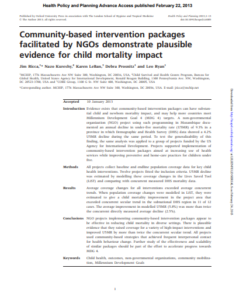ORGANIZATION
Academic Journal: Health Policy and Planning
CORE Group
USAID
YEAR PUBLISHED
2013
DESCRIPTION
Evidence exists that community-based intervention packages can have substantial child and newborn mortality impact, and may help more countries meet Millennium Development Goal 4 (MDG 4) targets. A non-governmental organization (NGO) project using such programming in Mozambique documented an annual decline in under-five mortality rate (U5MR) of 9.3% in a province in which Demographic and Health Survey (DHS) data showed a 4.2% U5MR decline during the same period. To test the generalizability of this finding, the same analysis was applied to a group of projects funded by the US Agency for International Development. All projects collect baseline and endline population coverage data for key child health interventions. U5MR decline was estimated by modelling these coverage changes in the Lives Saved Tool (LiST) and comparing with concurrent measured DHS mortality data. Results indicate that NGO projects implementing community-based intervention packages appear to be effective in reducing child mortality in diverse settings.

